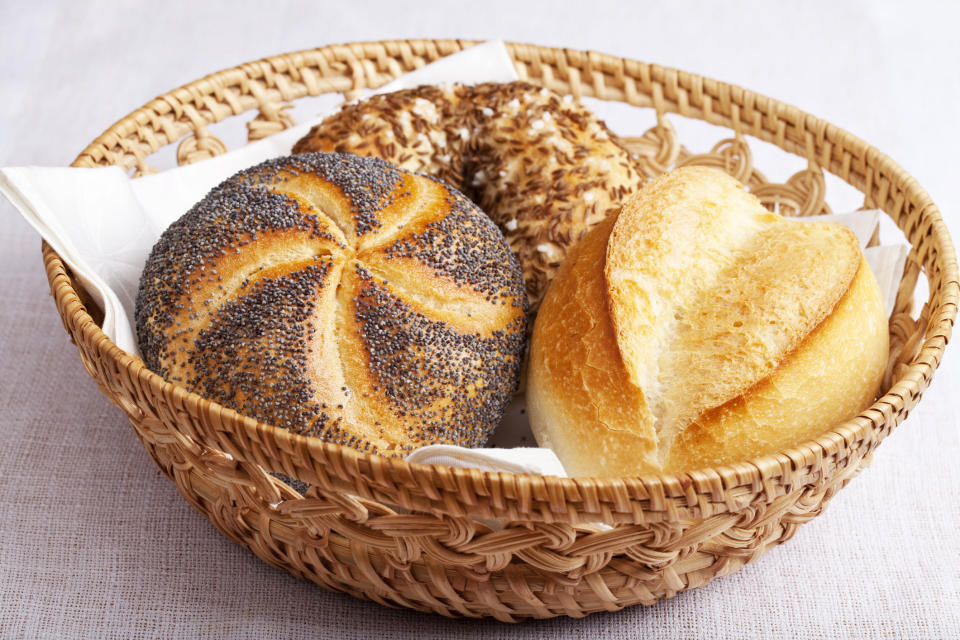What You Need to Know About Low-Carb Diets

By now you've probably seen and heard the term "low carb" used in hundreds of scenarios - from flashy headlines to celebrity endorsements and even the snack aisle. That said, internet buzz around a weight loss diet one morning can be entirely contradicted by another trend the next day.
That's why I'm breaking down everything you need to know about the low-carb life and redefining which carbs you should eat versus the ones to cut back on.
What are carbs, exactly?
Little known fact: Carbs are actually in almost everything we eat, but in very trace amounts. Let's start with some basic biochemistry: Dietary carbs are made up of sugar molecules called saccharides. Saccharides break down in order to be digested and absorbed in your body, where they are responsible for literally everything: metabolism, tissue and organ function, even the synapses your brain is firing right now!
In the plainest of terms: These simple sugars fuel our organs. While protein, fat and carbs break down into smaller molecules to provide energy, glucose (the simplest sugar molecule) is the preferred source. Our very smart and energy-saving bodies do everything in their power to provide enough glucose to get stuff done, including using fat and protein when necessary.
They use what they need for metabolic functions and ultimately store whatever's left over in adipocytes - a fancy, science-y way of saying "fat cells." What happens if we're storing more than we're using? We gain weight. What happens if we use more than we store? We lose weight. Easy as (crust-less) pie, right?
Er, sort of.
How do low-carb diets work for weight-loss?
Eating plans that cut carbs to less than 50 grams per day can induce ketosis, a physiological state in which your body uses fat cells for energy. There are two main reasons why low-carb diets show results quickly.
First: Since we use carbs for energy, cutting them means we have to pull from somewhere else to keep our organs functioning. Our bodies then turn to the glucose stored in our muscles as glycogen for fuel.
What else happens when we break down muscle glycogen? We lose water weight! Our muscles store about 3 grams of water for every gram of glycogen, meaning we can lose quite a bit of weight right away when we tap into glycogen stores for fuel. That's why someone who loses weight in "just one week!" from a low-carb plan is likely losing water weight, not necessarily real weight that stays off over time.
Second: Most of us eat too many carbs to begin with. About half of our calories should come from carbs, according to the USDA Dietary Guidelines for Americans. That's about 250 grams per day for a 2,000 calorie diet, or even fewer if you're eating less than that. When you consider all of the grain-based foods and sneaky sources of added sugar, it's easy eat a whole lot more than the recommended amount.

What can you eat on a low-carb diet?
There's a major misconception about low-carb diets that I hear frequently: "Steak, bacon, butter, cheese, oils, avocado, coconut oil … You can eat all of the meat and fat you want, right?!" Not quite. Ultimately, all diets rely on the same principle: Calories in versus calories out.
Some diets cut calories from all macronutrients (protein, fat and carbs) in equal amounts. Others cut from fat, and some buzzy types cut from carbs. But the end result is the same: You cut calories, you'll lose weight. If you eat them in excess, you'll gain weight. So just because you've eliminated one macronutrient doesn't give you free rein to chow down on another type of food!
Should you try it?
Large scale studies regularly compare "low-carb" plans to "low-fat" ones. One day, low-fat wins. The next day, it's low-carb. The truth is that the answer is somewhere in the middle - and there are some major downsides to restricting carbs completely.
While some low-carb diets allow for the carbohydrates found in plant-based foods, others restrict them almost entirely - namely, the ultra-trendy ketogenic diet. Since these foods contain the highest amount of water and dietary fiber, it's crucial to consider both the short-term side effects (constipation) and the long-term ones (increased risk of GI cancers and decreased immune function).
Although research has suggested that low-carb plans show more long-term promise than low-fat ones, large-scale studies typically follow subjects for only a year post-trial. That means that even if you can keep off weight on a low-carb plan for a full 12 months, we don't really know how well they work for two, five or 10 years.
The reason why low-carb plans so often fail most of us is that they're not sustainable for the long term. They often fail to provide a "fallback" plan for what to eat when low-carb foods aren't readily available. Birthdays, holidays, work functions … there's likely at least one scenario in which you'll find yourself eating high-carb foods that don't necessarily "fit" into your plan.

The same reasons why we see immediate weight loss on carbohydrate-restricted diets is the same reason why we see immediate weight gain after adding a seemingly harmless sandwich back into the mix: The water weight comes back immediately with glycogen storage.
Anyone who's dieted knows how demoralizing it feels when you've been working so hard to lose weight, only to watch it come back even faster than it went away. Since it's only human nature to feel so darn defeated, we can't help but kick ourselves and say "I give up!" That leads us right back to where we started: diving head first into the bread basket and eating way more than half of our calories from carbs per day.
It's for that last reason alone that I'd skip low-carb diet plans. It can be so downright discouraging when we "fall off the wagon" that it seems completely pointless to eat healthier at all.
What should you do instead?
All types of carbs were not created equal! It's the processed carbs - the kind found in junk foods, condiments and beverages - that derail weight loss. When you cut back dramatically on these "carbs," you'll eliminate less nutritious, less satisfying foods and fill up on ones with fiber and H2O instead.
The easiest place to start: Try GH's SuperCarb Diet, which includes starchy veggies, fruit and 100% whole grains. These plant-based foods will help with long-term weight loss and contribute to a lower risk of chronic disease. Remember: Filling up on nutrient-dense foods with a little bit of indulgence now and again is key to losing weight for the long run - not temporary quick fixes!
You Might Also Like

